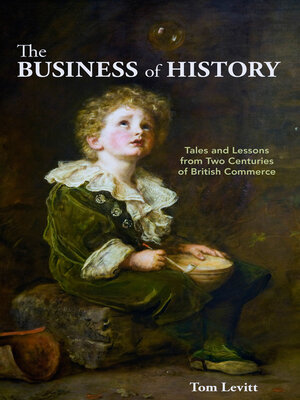The Business of History
ebook ∣ Tales and Lessons from Two Centuries of British Commerce
By Tom Levitt

Sign up to save your library
With an OverDrive account, you can save your favorite libraries for at-a-glance information about availability. Find out more about OverDrive accounts.
Find this title in Libby, the library reading app by OverDrive.



Search for a digital library with this title
Title found at these libraries:
| Library Name | Distance |
|---|---|
| Loading... |
Why are today's businesses as they are? Building on WH "Beable's Romance of Great Businesses", a description of 32 significant companies published a century ago, this book explores how some British commercial icons started, evolved and then coped with an ever-more-complex economic environment. Who were those Victorian entrepreneurs? How did their beliefs influence their work? What is their legacy? What has been lost and what gained? Finding that the political and religious affiliations of many leaders were not those of the 'establishment', how did owners' awareness of their companies' social and environmental impacts evolve? Why did ownership shift away from families towards shareholders and high finance? Of the 32 companies, what was it about just four that has enabled them to survive intact into the twenty-first century? Twenty others still exist but only as brand names, often well-known, but eight have disappeared altogether – including some within living memory. How inevitable was their failure? Our 'cast' includes Unilever, Boots, Dunlop, Pears, Cadbury, WHSmith, Bass, Wedgwood, Schweppes, Colman's and more. From considering why the industrial revolution happened when it did to how shareholding opened the doors to widespread fraud and from the business case for Victorian philanthropy to the opportunities created by the UN Sustainable Development Goals, we argue that business cannot divorce itself from the social and physical environment in which it operates. From a nineteenth-century free-for-all to today's highly regulated global economy, we demonstrate to both academics and the general reader the positive and negative impacts of taxation, regulation and 'events' on business historically.|Why are today's businesses as they are? Building on WH "Beable's Romance of Great Businesses", a description of 32 significant companies published a century ago, this book explores how some British commercial icons started, evolved and then coped with an ever-more-complex economic environment. Who were those Victorian entrepreneurs? How did their beliefs influence their work? What is their legacy? What has been lost and what gained? Finding that the political and religious affiliations of many leaders were not those of the 'establishment', how did owners' awareness of their companies' social and environmental impacts evolve? Why did ownership shift away from families towards shareholders and high finance? Of the 32 companies, what was it about just four that has enabled them to survive intact into the twenty-first century? Twenty others still exist but only as brand names, often well-known, but eight have disappeared altogether – including some within living memory. How inevitable was their failure? Our 'cast' includes Unilever, Boots, Dunlop, Pears, Cadbury, WHSmith, Bass, Wedgwood, Schweppes, Colman's and more. From considering why the industrial revolution happened when it did to how shareholding opened the doors to widespread fraud and from the business case for Victorian philanthropy to the opportunities created by the UN Sustainable Development Goals, we argue that business cannot divorce itself from the social and physical environment in which it operates. From a nineteenth-century free-for-all to today's highly regulated global economy, we demonstrate to both academics and the general reader the positive and negative impacts of taxation, regulation and 'events' on business historically.







